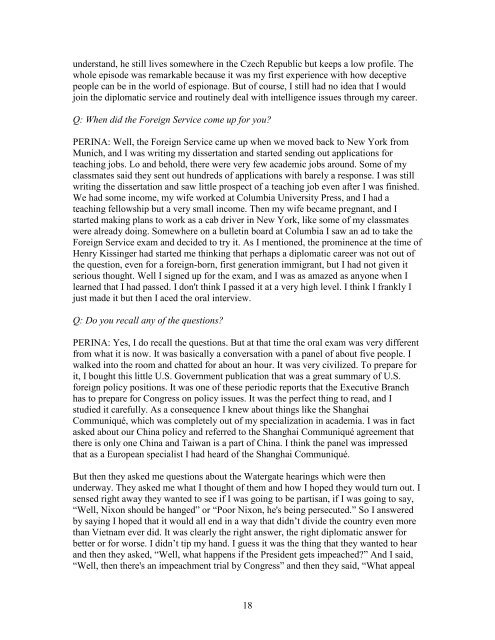ambassador rudolf v. perina - Association for Diplomatic Studies and ...
ambassador rudolf v. perina - Association for Diplomatic Studies and ...
ambassador rudolf v. perina - Association for Diplomatic Studies and ...
Create successful ePaper yourself
Turn your PDF publications into a flip-book with our unique Google optimized e-Paper software.
underst<strong>and</strong>, he still lives somewhere in the Czech Republic but keeps a low profile. The<br />
whole episode was remarkable because it was my first experience with how deceptive<br />
people can be in the world of espionage. But of course, I still had no idea that I would<br />
join the diplomatic service <strong>and</strong> routinely deal with intelligence issues through my career.<br />
Q: When did the Foreign Service come up <strong>for</strong> you?<br />
PERINA: Well, the Foreign Service came up when we moved back to New York from<br />
Munich, <strong>and</strong> I was writing my dissertation <strong>and</strong> started sending out applications <strong>for</strong><br />
teaching jobs. Lo <strong>and</strong> behold, there were very few academic jobs around. Some of my<br />
classmates said they sent out hundreds of applications with barely a response. I was still<br />
writing the dissertation <strong>and</strong> saw little prospect of a teaching job even after I was finished.<br />
We had some income, my wife worked at Columbia University Press, <strong>and</strong> I had a<br />
teaching fellowship but a very small income. Then my wife became pregnant, <strong>and</strong> I<br />
started making plans to work as a cab driver in New York, like some of my classmates<br />
were already doing. Somewhere on a bulletin board at Columbia I saw an ad to take the<br />
Foreign Service exam <strong>and</strong> decided to try it. As I mentioned, the prominence at the time of<br />
Henry Kissinger had started me thinking that perhaps a diplomatic career was not out of<br />
the question, even <strong>for</strong> a <strong>for</strong>eign-born, first generation immigrant, but I had not given it<br />
serious thought. Well I signed up <strong>for</strong> the exam, <strong>and</strong> I was as amazed as anyone when I<br />
learned that I had passed. I don't think I passed it at a very high level. I think I frankly I<br />
just made it but then I aced the oral interview.<br />
Q: Do you recall any of the questions?<br />
PERINA: Yes, I do recall the questions. But at that time the oral exam was very different<br />
from what it is now. It was basically a conversation with a panel of about five people. I<br />
walked into the room <strong>and</strong> chatted <strong>for</strong> about an hour. It was very civilized. To prepare <strong>for</strong><br />
it, I bought this little U.S. Government publication that was a great summary of U.S.<br />
<strong>for</strong>eign policy positions. It was one of these periodic reports that the Executive Branch<br />
has to prepare <strong>for</strong> Congress on policy issues. It was the perfect thing to read, <strong>and</strong> I<br />
studied it carefully. As a consequence I knew about things like the Shanghai<br />
Communiqué, which was completely out of my specialization in academia. I was in fact<br />
asked about our China policy <strong>and</strong> referred to the Shanghai Communiqué agreement that<br />
there is only one China <strong>and</strong> Taiwan is a part of China. I think the panel was impressed<br />
that as a European specialist I had heard of the Shanghai Communiqué.<br />
But then they asked me questions about the Watergate hearings which were then<br />
underway. They asked me what I thought of them <strong>and</strong> how I hoped they would turn out. I<br />
sensed right away they wanted to see if I was going to be partisan, if I was going to say,<br />
“Well, Nixon should be hanged” or “Poor Nixon, he's being persecuted.” So I answered<br />
by saying I hoped that it would all end in a way that didn’t divide the country even more<br />
than Vietnam ever did. It was clearly the right answer, the right diplomatic answer <strong>for</strong><br />
better or <strong>for</strong> worse. I didn’t tip my h<strong>and</strong>. I guess it was the thing that they wanted to hear<br />
<strong>and</strong> then they asked, “Well, what happens if the President gets impeached?” And I said,<br />
“Well, then there's an impeachment trial by Congress” <strong>and</strong> then they said, “What appeal<br />
18
















